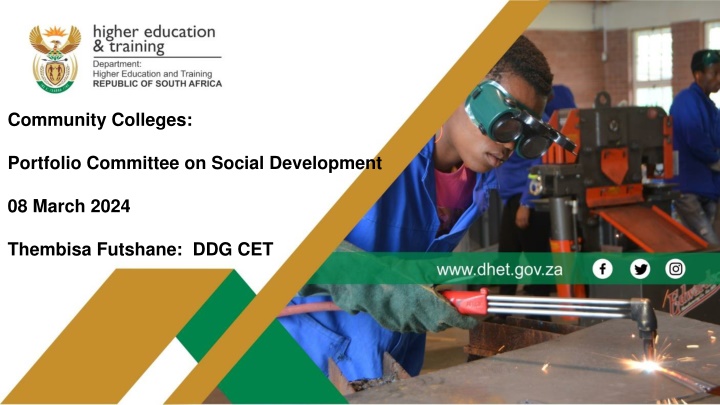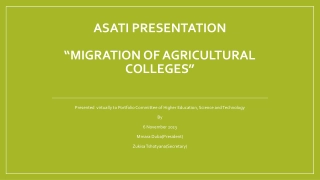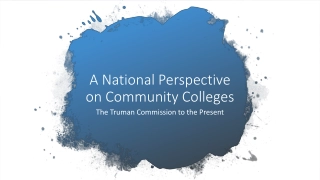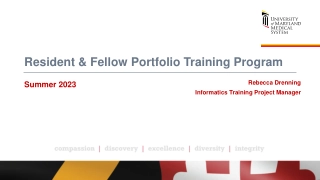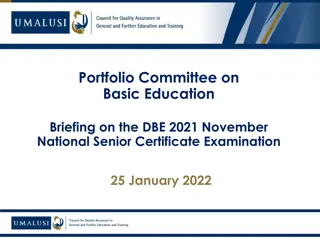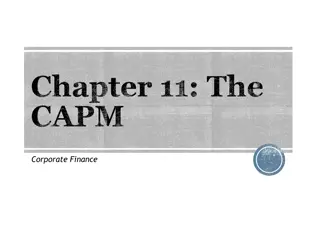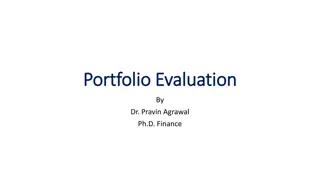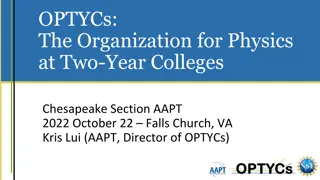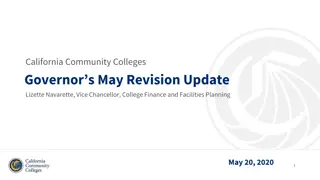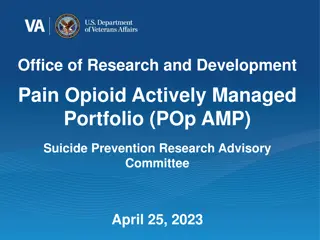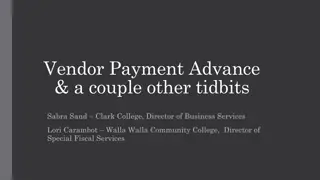Community Colleges: Portfolio Committee on Social Development
The portfolio committee on social development in South Africa reviewed the progress of Community Education and Training (CET) colleges. The presentation outlined the legislative framework, background, vision, institutional landscape, funding, and partnerships. Community colleges aim to provide education opportunities for out-of-school youth and adults to enhance their livelihoods and access to higher education and employment.
Download Presentation

Please find below an Image/Link to download the presentation.
The content on the website is provided AS IS for your information and personal use only. It may not be sold, licensed, or shared on other websites without obtaining consent from the author.If you encounter any issues during the download, it is possible that the publisher has removed the file from their server.
You are allowed to download the files provided on this website for personal or commercial use, subject to the condition that they are used lawfully. All files are the property of their respective owners.
The content on the website is provided AS IS for your information and personal use only. It may not be sold, licensed, or shared on other websites without obtaining consent from the author.
E N D
Presentation Transcript
Community Colleges: Portfolio Committee on Social Development 08 March 2024 Thembisa Futshane: DDG CET 1
PRESENTATION OUTLINE Background and Vision Legislation and Policy Size and Shape Institutional landscape and Infrastructure Student enrolment, targets and performance Programmes and Qualification Mix Funding and financing Partnerships Conclusion 2 2
LEGISLATIVE AND POLICY FRAMEWORK Continuing Education and Training Act, 2006 National Policy on Learning and Teaching Support Materials National Policy on Curriculum Development and Implementation in CET Colleges Regulations on the conduct, administration and management of assessment for the National Senior Certificate for Adults (NASCA) National Policy on the conduct, administration and management of assessment for the GETCA National Improvement Plan for Teaching and Learning for CET Colleges Policy on Minimum Requirements for programmes leading to qualifications for educators and lecturers in Adult and Community Education and Training Regulations on the Assessment Process and Procedures for Adult Education and Training (AET) National Qualifications Framework (NQF) Time-Table Norms and Standards for CET Colleges National Policy pertaining to the conduct, administration and management of College examinations National Strategy for Partnerships in CET Colleges National Policy on Student and Community Support Services 3 3
BACKGROUND In 2009, the Department of Education was split into the Department of Basic Education (DBE) and the Department of Higher Education and Training (DHET). The legislative functions of Adult Education and Further Education and Training Colleges were located in the DHET. In 2013, the White Paper on Post-School Education and Training, (WP-PSET) calls for the establishment of Community Education and Training (CET) Colleges In 2015, The Continuing Education and Training Act established nine (9) Community Education and Training Colleges (one per province). All former Public Adult Learning Centres were incorporated as Community Learning Centres (CLCs). The administration of CET colleges migrated from the Provincial Education Departments (PEDs) to DHET in April 2015. The examinations function only migrated from PEDs on 01 April 2022. 4
MANDATE OF COMMUNITY COLLEGES Community Colleges are meant to cater for out of school youth and adults who have never been to school, those who seek second chance to study in order to improve their livelihoods, improve chances of access to higher education institutions and those who seek to improve their chances of employment. 5
PROBLEM STATEMENT NEETS Total number of NEETs (2022) = 17,136,000 from ages 15 to 60. Highest number of NEETs (8,019,000) are between the ages of 35 to 60. SOURCE STATS SA. ILLITERACY RATE In South Africa there are nearly four million adults (10.5%) who are functionally illiterate. Number and percentage of persons in the population aged 20 and older who have not completed Grade 7 and above. Source: GHS, StatsSA (2023). UNEMPLOYMENT RATE Official unemployment rate stands at 32,1%. Source: Quarterly Labour Survey (Q4: 2023) 6
COMMUNITY COLLEGES INSTITUTIONAL LANDSCAPE 20 The Community College Sector has 200 CLCs and 1 591 SCs 225 15 47 11 267 163 125 40 15 7 260 171 80 30 242 15 Community Learning Centres (CLCs) 58 Satellite Centres (SCs) 7
PROGRAMME QUALIFICATION MIX NSF and SETA funds to be used to diversify programme offerings. Increase number of accredited Centres. 2023/24 target not met. Projections: formal qualifications enrolments to decrease while occupational skills and non-formal programmes increase. ENROLMENTS PER LEVEL - 2021 ACADEMIC YEAR 1% 7% 5% AET LEVEL 1 - 3 GETC/AET 4 NSC/SC 38% NON-FORMAL SKILLS 49% OCCUPATIONAL SKILLS 29.4 % NSC and GETC represent 87% of all enrolments There has been a marked increase in non-formal skills programmes, from 2,5% (2020) to 5% (2021). Together with occupational skills programmes, they contribute 6% enrolments. 8
PROGRAMME QUALIFICATION MIX (PQM) The National Register comprises the Programme and Qualification Mix that CET Colleges offer. All 9 CET Colleges offer the following Programme and Qualification Mix: o Basic Literacy Programmes (AET Levels 1, 2 and 3); o GETC: ABET (NQF Level 1); o Senior Certificate (amended) (NQF Level 4) offered in collaboration with the DBE; o Occupational Skills programmes (accredited part qualifications) offered in collaboration with SETAs, DSI, QCTO and the CIE (Catholic Institute of Education); and o Non-formal programmes offered in collaboration with DVV International (the German Institute for Adult Education) and local NGOs. These programmes may be useful for Older Persons. 9 9
OCCUPATIONAL SKILLS AND NON-FORMAL PROGRAMMES OCCUPATIONAL SKILLS PROGRAMMES NON-FORMAL PROGRAMMES End User Computer Welding Computer and Digital Support Assistant Seamstress Sewing, handcraft knitting, Crocheting, Pottery, gardening, poultry, beadwork, leathercraft, baking. Automotive Body Repair & Maintenance Arc Welder Entrepreneurship Business practices Heavy Duty Driver s License K53 Learners license 10 10
OCCUPATIONAL SKILLS AND NON-FORMAL PROGRAMMES OCCUPATIONAL SKILLS PROGRAMMES NON-FORMAL PROGRAMMES End User Computer Cell Phone repairer Seamstress New Venture Creations Welding Gardening Beading End User Computer Assistant Bricklayer, L1, 45 Credits Plumbing Hand, NQF L3, 49 Credits Coded Welding, NQF L4, 96 Credits New Venture Creation NQF L2, 32 Credits Gardening Non-formal programmes can be developed or sourced from the various partners. The needs of Older Persons will have to be determined in collaboration with the Department of Social Development. Workplace Preparation National Certificate Bread and Flour Confectionery Baking 11 11
COMMUNITY COLLEGES PQM The CET Act 16 of 2006 and the National Policy on Curriculum Development and Implementation in CET Colleges outline the Programmes and Qualifications Mix that CET Colleges should offer as follows: Formal Academic Programmes: General Education and Training Certificate: Adult Basic Education and Training (GETC: ABET) NQF 1. This qualification caters to youth and adults that cannot read and write, to those with education attainment below Grade 9. All the CLCs and SLCs offer this qualification. Senior Certificate at NQF 4. This qualification offers a second chance opportunity to students who want to obtain matric for the first time or improve their matric. DHET has also partnered with DBE to expand their Second Chance Matric Programmes (SCMP) to CET College students. DBE donated electronic learning material as well as hard copies of the study guides for all gateway subjects to CET Colleges. The SCMP online link was also shared with college students for access to online resources. CLCs and SLC are accredited by DBE as examination centres for this qualification. National Senior Certificate (NSC) at NQF 4. Some colleges are also offering rewrite opportunities to students who want to improve their NSC subjects. Tuition and examination are offered in some CLCs. 12
COMMUNITY COLLEGES PQM Occupational Skills Programmes: CET Colleges are offering occupational skills programmes mainly accredited by different SETAs. The following are some of the SETA-accredited occupational skills programmes offered in CET Colleges: End User Computing-MICTSETA Accredited o Clothing Manufacturing and Sewing -FP&M SETA accredited o New Venture Creation-Services SETA accredited o The QCTO has accredited CET colleges to offer the following occupational skills and are earmarked to be offered in 2023. Computer and Digital Support Assistant o Seamstress o Assistant Baker o Cook Assistant o Basic Furniture upholsterer o Entrepreneurship training in partnership with SEDA. 18 CLCs are piloting entrepreneurship training targeting small business owners or prospective entrepreneurs. 400 College students and community members have been trained and supported by SEDA at these CLCs so far. 13
COMMUNITY COLLEGES PQM Non-Formal Programmes These are some of the non-credit-bearing programmes that do not lead to a part or full qualification. The following non- formal programmes are offered in CET Colleges: o Driving Licence o Baking o Gardening o Knitting and Crocheting o Beadwork Some of the NSF programmes offered include: 1. Beauty & Nail Technology 2. Welding Workshop Assistant 3. GBV Advocacy, Victim and Mentor Support 4. Community House Builder Level 2 5. Tyre repair and fitment 6. Cell phone repairs 7. 8. 9. 10. Carpentry Skills Programme 11. Electrical Engineering Level 2 12. Learner s Driver s License Community Health Work Early Childhood Development L3 Solar Geyser Installation and Maintenance 14
PRELIMINARY BUDGET ESTIMATES 2024 MTEF BUDGET ESTIMATES REQUIRED AS PER FUNDING MODEL CET COLLEGES TOTAL 2024 ESTIMATES TOTAL 2025 ESTIMATES TOTAL 2026 ESTIMATES EC 121 031 087 30 049 000 31 395 000 32 839 000 FS 69 989 077 19 255 000 20 118 000 21 043 000 GP 191 591 668 44 192 000 46 172 000 48 296 000 KZN 157 081 790 37 450 000 39 128 000 40 928 000 LP 99 001 206 25 284 000 26 417 000 27 632 000 MP 87 247 345 21 304 000 22 258 000 23 282 000 NC 40 173 737 12 492 000 13 052 000 13 652 000 NW 66 923 054 17 422 000 18 202 000 19 039 000 WC 52 323 013 13 696 000 14 310 000 14 968 000 TOTAL 885 361 978 221 144 000 231 052 000 241 679 000 15
PRELIMINARY BUDGET ESTIMATES AS PER THE MODEL AND 2024 MTEF Preliminary allocation for 2023 is based on the parameters and assumptions provided for in new funding model. The model was approved in 2022 and implemented with effect from 2023. These parameters and assumptions were applied to the 2024 MTEF baseline allocation for the subsidy to Community colleges. The funding gap is 76%. The Department communicated the preliminary budget estimates to Community Colleges for planning purposes in 30 November; and The final budget allocations in March 2024. TRANSFERS TO COLLEGES The 3rd transfer in the 2023/24 financial year to community Colleges was made in October 2023. The fourth and final 25% transfer for 2023/24 is being processed for payment before the of January 2024. This will enable colleges to run operations for the first quarter of the academic year. 16
DSD PUBLIC INPUTS/REQUESTS Community Education and Training is no longer provided at residential care facilities for older persons. Older persons must be taught writing skills. A request was made that CET should be re-introduced at residential care facilities. There should be training programmes where older persons can be trained onhow to use technology ATMs, smartphones and computers. They should also be educated on financial management. 17
CONCLUSION Recommend a partnership with DSD on providing programmes for older persons. Conclusion of a Protocol and implementation Plan with Department of Social Development enabler for collaboration. DHET requests older persons residential areas that require the identified programmes. These will be aligned with the nearest CLC/SLC. Lecturer provision in Older Person residence facilities, subject to a mapping to our Community Learning Centres. Work out the costing implications beyond lecturer provision, if any. DSD and CET Branch to collaborate on a funding proposal to the National Skill Fund to fund programmes required by DSD that cannot be covered by the colleges due to financial constraints. Infrastructure access, maintenance and development access to Social Development facilities for programme provision. Consider establishment of learning sites as SLCs in residences. Council College approval. GETC students (Ancillary Health Care, Eearly Childhood Development, Arts and Culture, Agricultural Studies) can do practical community tasks in older persons residential areas. 18
